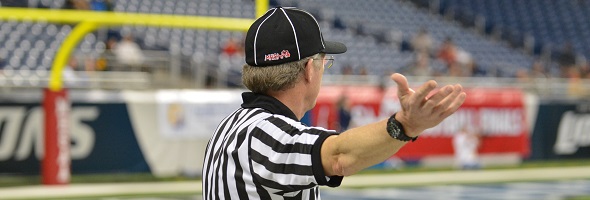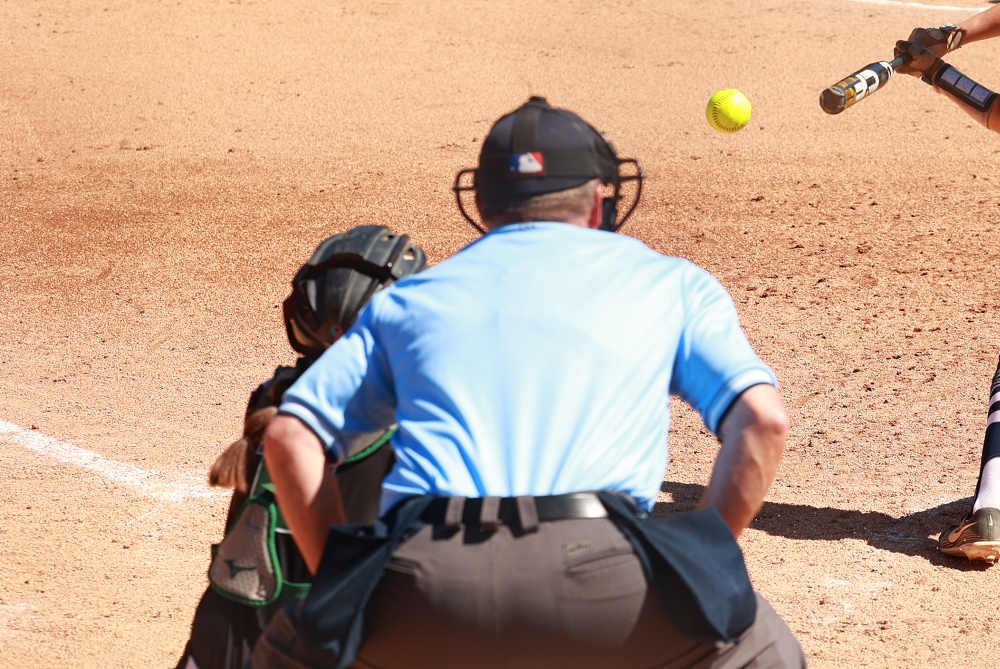
Be the Referee: Play Clock Experiment
September 1, 2016
This week, MHSAA assistant director Mark Uyl explains the 40-second game clock Michigan football schools are allowed to try this fall.
Be The Referee is a series of short messages designed to help educate people on the rules of different sports, to help them better understand the art of officiating, and to recruit officials.
Below is this week's segment – Play Clock Experiment - Listen
From time to time, the MHSAA receives permission from the national rules making body, the National Federation of State High School Associations, to experiment with a new rule.
This fall in high school football, Michigan schools can experiment with a 40-second play clock. In this experiment, the 40-second play clock begins at the end of the previous play, giving teams consistency from week to week when the offense can next snap the ball.
With using the traditional 25-second play clock, it really depends on the referee of the game in terms of the pace on how quickly the offenses can go.
Past editions
Aug. 25: Clipping in the Free Blocking Zone - Listen

Be the Referee: Softball Strikeout
By
Paige Winne
MHSAA Marketing & Social Media Coordinator
April 11, 2023
Be The Referee is a series of short messages designed to help educate people on the rules of different sports, to help them better understand the art of officiating, and to recruit officials.
Below is this week's segment – Softball Strikeout - Listen
It’s time for … You make the call.
With a 3-2 count, a softball hitter takes a swing at a pitch that comes in high and inside.
Her swing completely misses the pitch, but the ball subsequently hits her on the right shoulder during the follow-through of her swing. What should happen?
Is the batter awarded first base for being hit by a pitch?
Is a foul ball called, with the count remaining full and the at-bat continuing?
Or is the batter out on strikes, and the ball is dead?
What about any potential runners on base – would they be allowed to advance in this scenario?
A batter with two strikes who swings and misses and then is subsequently hit by the pitch is out.
Any runners on base must stay put as the ball is ruled immediately dead after it hits the batter.
If you said it’s a strikeout – you are correct. And since it’s also ruled a dead ball after the out, any runners on base are not allowed to advance.
Any strike that also hits the batter is ruled a strike … and no base is awarded for being hit by the pitch.
Previous Editions:
March 14: Basketball Instant Replay - Listen
March 7: Hockey Overtime - Listen
Feb. 28: Baker Bowling - Listen
Feb. 21: Ski Finish - Listen
Feb. 14: Swimming Touchpads - Listen
Feb. 7: In or Out-of-Bounds in Wrestling - Listen
Jan. 31: Over the Back - Listen
Jan. 24: Competitive Cheer Judges - Listen
Jan. 17: More Lines - Listen
Jan. 10: On the Line - Listen
Jan. 3: Basketball Measurements - Listen
Dec. 13: Pregame Dunks - Listen
Dec. 6: Gymnastics Judges - Listen
Nov. 22: Football Finals Replay - Listen
Nov. 15: Back Row Illegal Blocker - Listen
Nov. 8: Swim Turn Judges - Listen
Nov. 1: Soccer Referee Jersey Colors - Listen
Oct. 25: Cross Country Tie-Breaker - Listen
Oct. 18: Soccer Shootouts - Listen
Oct. 11: Safety in End Zone - Listen
Oct. 4: Football Overtime Penalty - Listen
Sept. 27: Kickoff Goal - Listen
Sept. 20: Soccer Timing - Listen
Sept. 13: Volleyball Replays - Listen
Sept. 6: Switching Sides - Listen
Aug. 30: Play Clock - Listen
Aug. 23: Intentional Grounding Change - Listen

